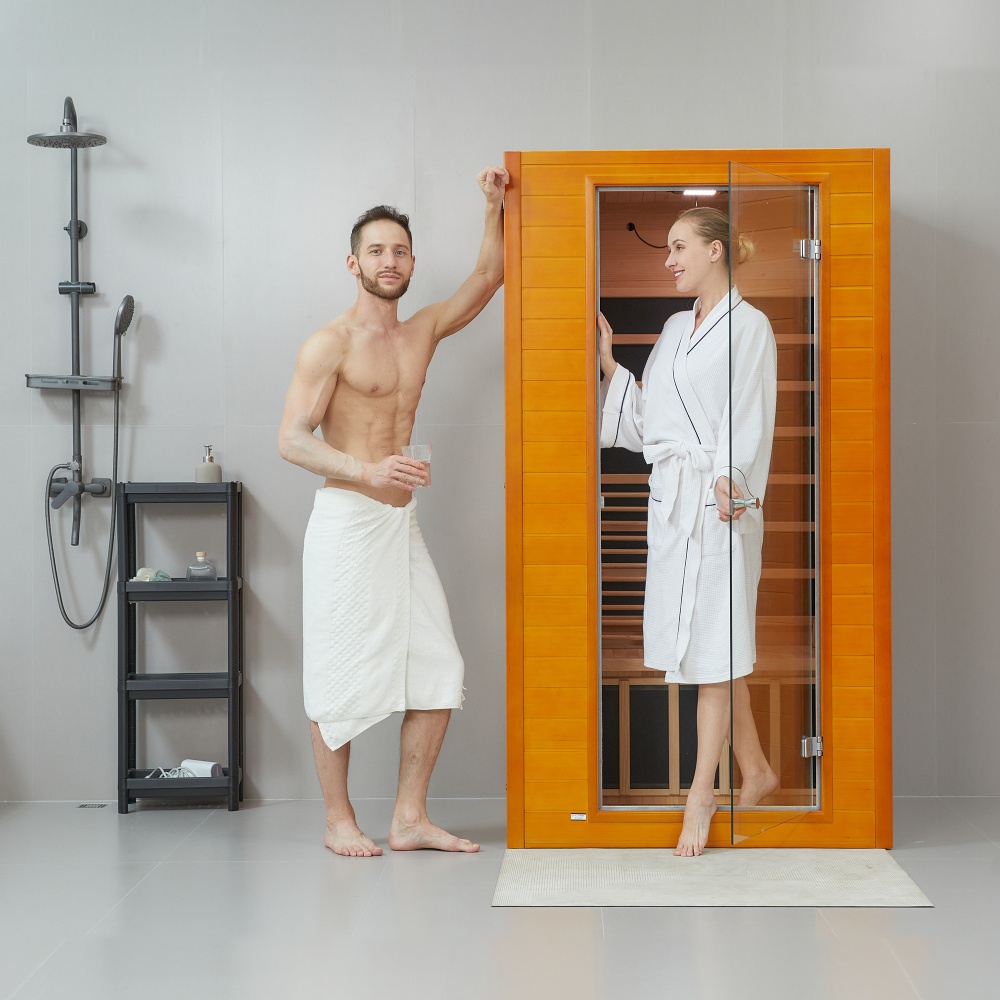General Sauna Questions
What is an indoor sauna?
An enclosed space inside your home designed to produce dry or steam heat for sweating and relaxation.
How does an indoor sauna work?
It uses heaters (electric, infrared, or steam) to raise the temperature and promote sweating.
Is sauna heat dry or humid?
Traditional saunas are dry; steam rooms are humid. Some saunas allow adding steam with water on hot stones.
What’s the difference between infrared and traditional saunas?
Infrared saunas use light waves to heat your body directly, while traditional saunas heat the air around you.
How hot does an indoor sauna get?
Traditional saunas: 150°F–195°F (65°C–90°C); Infrared: 120°F–140°F (49°C–60°C).
Do saunas use a lot of electricity?
Not really — most use about the same as a clothes dryer during operation.
Are indoor saunas safe for home use?
Yes, if used properly and installed correctly.
How long should you stay in a sauna?
15–20 minutes is generally safe for most people.
Can I use a sauna every day?
Yes, if you’re healthy and stay hydrated.
Do I need a shower after sauna use?
It’s a good idea — helps wash away sweat and cools you down.
Health Benefits
Are indoor saunas good for your health?
Yes — they may improve circulation, relax muscles, and support detox.
Can saunas help with weight loss?
You may lose water weight temporarily, but it’s not a substitute for diet and exercise.
Do saunas help with sore muscles?
Absolutely — heat increases blood flow, which can ease tension and pain.
Can sauna use reduce stress?
Yes! The heat and quiet environment can be incredibly relaxing.
Is it true that saunas detox the body?
You sweat out some toxins, but your liver and kidneys do most of the detoxing.
Are saunas good for heart health?
Some studies show regular sauna use may lower blood pressure and improve circulation.
Can indoor saunas help improve sleep?
Yes — the relaxation effect may help you fall asleep faster.
Do saunas boost the immune system?
Regular use may support immunity by improving circulation and reducing stress.
Is sauna use good for your skin?
Yes — sweating can open pores and help clear up mild skin issues.
Can a sauna help with joint pain or arthritis?
Heat therapy from saunas may ease stiffness and reduce pain.
Safety & Precautions
Are saunas safe for people with heart conditions?
Talk to your doctor first — some heart conditions may not be compatible with heat exposure.
Can you use a sauna if you’re pregnant?
No — it’s best to avoid sauna use during pregnancy.
Is sauna use safe for children?
Only with adult supervision and shorter sessions — check with a pediatrician.
Can I faint in a sauna?
Yes, if you overheat or dehydrate — always drink water and don’t overdo it.
Should I drink water before using a sauna?
Definitely — staying hydrated is crucial.
Can sauna use cause dehydration?
Yes — you’re sweating a lot, so drink plenty of fluids before and after.
Is it okay to eat before a sauna session?
Eat lightly; don’t go in with a full or empty stomach.
Can I use a sauna after drinking alcohol?
No — combining heat and alcohol increases the risk of dehydration or passing out.
Are there risks of using a sauna too often?
Daily use is fine for most people, but overuse can lead to dehydration or fatigue.
Should I wear clothes in the sauna?
Light clothing or a towel is recommended — avoid synthetic fabrics that trap heat.
Hygiene & Maintenance
How do I clean an indoor sauna?
Wipe down benches and floors after use. Use gentle cleaners weekly.
Do I need to disinfect the sauna?
Yes — especially if multiple people use it.
Can bacteria grow in a sauna?
It can if not cleaned regularly, especially in damp areas.
Should I sit on a towel in the sauna?
Yes — it helps absorb sweat and keeps the bench cleaner.
Do saunas smell?
If maintained properly, no. Regular cleaning prevents odor.
Installation & Space
Can I install a sauna in an apartment?
Yes — infrared or portable saunas are good for small spaces.
Do I need ventilation for an indoor sauna?
Yes — proper airflow is important for comfort and safety.
Can a sauna damage my home with heat or moisture?
Not if installed properly with the right materials and ventilation.
Is it expensive to run an indoor sauna?
It depends on size and frequency of use — but generally affordable.
What kind of flooring is best under a sauna?
Tile or waterproof vinyl — avoid carpet or wood.
Sauna Use & Special Conditions
Is sauna use okay if I have high blood pressure?
Possibly — but check with your doctor first.
Can people with asthma use a sauna?
Some find relief, others may feel discomfort — depends on the person.
Is sauna use helpful for colds or congestion?
It may temporarily relieve symptoms, but it’s not a cure.
Can a sauna reduce chronic fatigue?
Some users report feeling more energized after regular sessions.
Does sauna use affect fertility?
Prolonged heat exposure may lower sperm count in men temporarily.
Bonus Questions
Is it okay to work out before using a sauna?
Yes — sauna after exercise can aid in recovery.
Can I meditate in the sauna?
Absolutely — the quiet, warm space is ideal for mindfulness.
Do indoor saunas increase home value?
They can — especially if well-integrated and high-quality.
Can I use essential oils in my sauna?
Yes — use sauna-safe oils for a calming aromatherapy experience.
Is sauna use backed by science?
Many studies support the health benefits, especially for circulation and relaxation.
